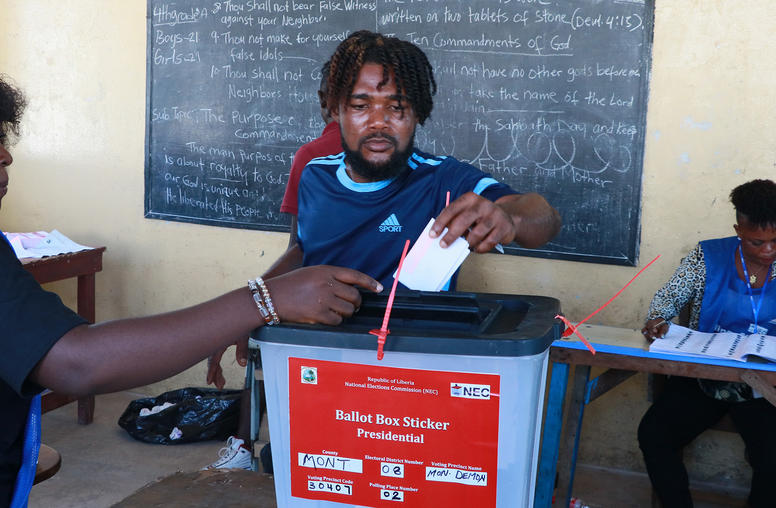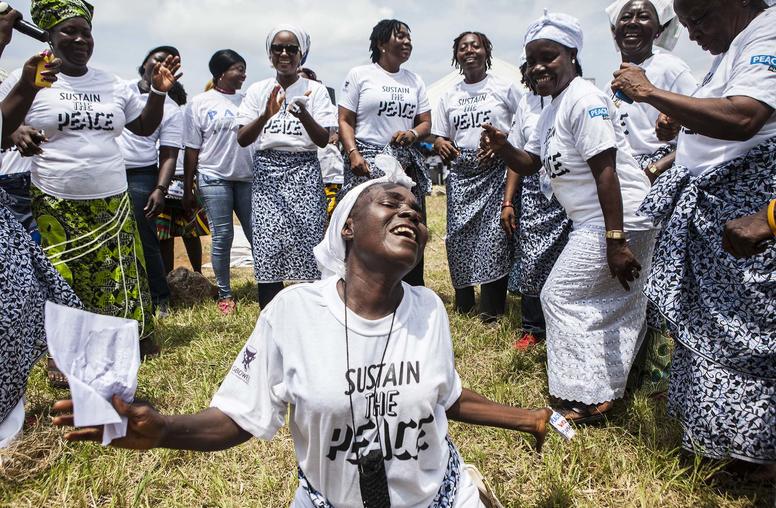Truth Commission: Liberia
Truth Commission: Truth and Reconciliation Commission of Liberia
Duration: 2006 - 2009
Charter: Truth and Reconciliation Commission Act
Commissioners: 9
Report: Vol. I (“preliminary report”) issued in December 2008, Vol. II (final but “unedited” report) issued in June 2009. In December 2009, an edited version of Vol. II was re-released together with Vol.III (appendices and specialized reports).
Truth Commission: Truth and Reconciliation Commission (TRC) of Liberia
Dates of Operation: February 20, 2006 – June 22, 2009 (3 years, 4 months; Public hearings did not start until January 2008 after many delays.)
Background: Under Samuel Doe’s regime (1980 - 1989), Liberia’s constitution was suspended. Charles Taylor launched a civil war in December 1989 in which approximately 200,000 people were killed and more than one million were displaced. The Economic Community of West African States (ECOWAS) intervened in 1991 to stop the violence. Between June 1990 and August 1996, fourteen peace accords were negotiated but the country remained unstable. Threatening a surge of violence, Taylor was elected president in 1997. In 1999, hostilities resumed when Taylor’s government faced armed opposition by several rebel groups who besieged the capital, Monrovia.
A comprehensive peace agreement was signed by the government of Liberia, the main rebel groups and political parties of Liberia in Accra during summer 2003. After a transitional government was established, the UN Security Council authorized the UN Mission in Liberia to replace the ECOWAS mission and to monitor the implementation of the peace agreement. The Accra agreement called for the establishment of an independent national commission on human rights, a truth and reconciliation commission, the reform of the Liberian police force, and the reorganization of the National Elections Commission. In May 2005 the Truth and Reconciliation Act was passed to implement the terms of the Accra agreement, and then President Ellen Johnson-Sirleaf, a former World Bank official, was elected president in November 2005.
Charter: The TRC’s mission is outlined in Part Six, Article XIII of the Accra Peace Accord (August 18, 2003). On May 12, 2005, the Liberian Transitional Legislative Assembly enacted the Truth and Reconciliation Commission Act establishing the commission and detailing its mandate.
Mandate: The Truth and Reconciliation Commission Act tasks the TRC “to promote national peace, security, unity and reconciliation” by investigating gross human rights violations and violations of humanitarian law, sexual violations, and economic crimes that occurred between January 1979 and October 2003. The commission may explore the period before 1979 as needed, and it is mandated to determine whether abuses were isolated incidents or part of a systematic pattern, establish the antecedents, circumstances, factors and context of such violations and abuses, and determine those responsible for the commission of the violations, their motives as well as the impact of the abuses on victims. In addition, the commission is mandated to provide a forum against impunity, establish the record of the past and compile a public report with findings and recommendations.
Commissioners and Structure: Chaired by Jerome Verdier, Liberian human rights activist and environmental lawyer, the commission consists of nine commissioners: four women and five men. After a public vetting and recruitment process in late 2005, the commissioners were selected by then transitional Head of State Gyude Bryant and afterward approved by President Ellen Johnson-Sirleaf. A three-member International Technical Advisory Committee was provided for by the TRC Act (nominated by ECOWAS and the UN High Commissioner for Human Rights). The commissioners profiles and blogs of the commissioners are available on the TRC’s website.
Report: The first volume of the TRC’s final report and a summary were released on December 19, 2008. On June 30, 2009 the TRC issued what it called the final and consolidated, but “unedited” report which was submitted to the National Assembly and made public. On December 3, 2009 the final edited version was re-released together with numerous appendices and specialized reports on issues such as women, children, and economic crimes.
In addition, The Advocates for Human Rights published “A House with Two Rooms”, a report on the experience of the Liberian diaspora. All reports are accessible from the TRC’s website.
Findings:
Conclusions
- The major root causes of the conflict are, according to the TRC, attributable to poverty, greed, corruption, limited access to education, economic, social, civil and political inequalities; identity conflict; land tenure and distribution; the lack of reliable and appropriate mechanisms for the settlement of disputes; as well as the “duality of the Liberian political, social and legal systems which polarizes and widens the disparities between the Liberian peoples – a chasm between settler Liberia and indigenous Liberia (Consolidated Final Report, Vol. II, p. 16).”
- All factions to the Liberian conflict are responsible for abuses, including war crimes and crimes against humanity.
- The massive wave of gross violations and atrocities assumed a systematic pattern of abuse.
- All factions committed gender based violence against women and recruited children to participate in acts of violence.
- “External state actors in Africa, North America and Europe participated, supported, aided, abetted, conspired and instigated violence, war and regime change for political, economic and foreign policy advantages and gains (Consolidated Final Report, Vol. II, p. 18).”
Recommendations
- The TRC advised for the establishment of an Extraordinary Criminal Tribunal for Liberia and named individuals, corporations and institutions recommended for prosecution or, in some cases, for further investigation.
- The commission also included a list of individuals recommended to be barred from holding public office for thirty years (including President Ellen Johnson Sirleaf).
- The commission urged the Government of Liberia to guarantee the full enjoyment of social, economic and cultural rights, in addition to civil and political rights.
- The TRC's report called for the establishment of a National Palava Hut Forum as a complementary tool for justice and national reconciliation. The commission recommended that the Palava Hut process be based on traditional dispute resolution mechanisms. Persons recommended for prosecution in the TRC Report for the commission of international crimes would not be entitled to be pardoned through the Palava Hut process.
- The TRC recommended that the Government of Liberia assumes its full responsibility under international law to provide reparations for all those individuals and communities victimized by the years of instability and war, especially women and children. The commission recommended a reparation program of approximately US$500m over 30 years. The commission recommended general amnesty for children, and amnesty for lesser crimes in an effort to foster national healing and reconciliation if individuals admit their wrongs and express remorse.
- The commission recommended that institutional reform must be implemented to promote good governance and human rights, and to prevent the recurrence of abuses.
- The TRC recommended to the international community to continue its engagement with Liberia and the sub region.
Subsequent Developments:
Reforms
- According to the TRC Act, the president must report to the legislature on the implementation of the TRC's recommendations three months after the delivery of the report, and thereafter every three months. On August 28, 2009 Liberia's parliament announced they must "consult constituents for about a year" before deciding whether or not to implement the Commission's recommendations.
- In January 2011, the Liberian Supreme Court held that the recommendations banning a number of individuals from holding public office was unconstitutional.
Prosecutions
- While Charles Taylor has not been charged in connection with offenses committed in Liberia (only crimes in Sierra Leone), the Liberian Supreme Court ruled that no testimony about Taylor should be given to the TRC to avoid complications of his trial at the Special Court of Sierra Leone.
Special Notes: One of the unique features of the Liberian truth commission is the active inclusion of the Liberian Diaspora. The Diaspora Project began in June 2006 in Minneapolis, Minnesota (U.S.), which is home to approximately 5,000 Liberians living in the U.S. Diaspora hearings and outreach activities took place in eleven U.S. cities, in Ghana, Nigeria and in Sierra Leone where a significant number of Liberian refugees reside.
Sources:
Amnesty International. Liberia: Truth, Justice and Reparation: Memorandum on Truth and Reconciliation Act 2006. Available at https://www.amnesty.org/en/documents/afr34/005/2006/en/ (accessed July 3, 2008).
Bouwknegt, Thijs. The Liberian TRC - Immunity Versus Prosecutions, Radio Netherlands Worldwide International Justice, July 29, 2008. (accessed June 11, 2009).
BBC. "Liberia's Truth Commission Opens." October 10, 2006. Available at http://news.bbc.co.uk/2/hi/africa/6036531.stm (accessed June 15, 2008).
Center for the Study of Violence and Reconciliation. "Justice in Perspective - Truth and Justice Commission, Africa -Liberia." Center for the Study of Violence and Reconciliation. Available at http://www.justiceinperspective.org.za/index.php?option=com_content&task=view&id=17&Itemid=19 (accessed June 15, 2008).
Daily Observer. TRC Releases Final Report, December 4, 2009.
International Center for Transitional Justice. "Liberia." Available at http://ictj.org/our-work/regions-and-countries/liberia (accessed May 12, 2011).
Konneh, Ansu. Liberian Parliament Delay Action on Truth Commission Findings, Bloomberg, August 28, 2009. Available at http://www.bloomberg.com/apps/news?pid=20601116&sid=aIqClsvAY9T0
(accessed September 17, 2009).
Lohn, Martiga. "Liberia Truth Commission to Hear from Exiles in US." KansasCity.Com, June 10, 2008. Available at http://www.usatoday.com/news/nation/2008-06-10-1765007765_x.htm (accessed June 11, 2009).
Pajibo, Ezekiel "Civil Society and Transitional Justice in Liberia: A Practitioner's Reflection from the Field." International Journal of Transitional Justice 1, no. 2 (2007): 287-296.
Randall, Lawrence, Pulano, Cosme R. and International Center for Transitional Justice. "Transitional Justice Reporting Audit a Review of Media Coverage of the Truth and Reconciliation Process in Liberia." International Center for Transitional Justice ; UNESCO, 2008. Available at http://ictj.org/publication/transitional-justice-reporting-audit-review-media-coverage-truth-and-reconciliation (accessed May 12, 2011).
Schabas, William. Liberian Supreme Court Declares TRC Provisions Unconstitutional, February 17, 2011. Available at http://humanrightsdoctorate.blogspot.com/2011/02/liberian-supreme-court-declares-trc.html (accessed March 14, 2011).
"The Truth and Reconciliation Commission of Liberia." Available at https://www.trcofliberia.org/ (accessed February 2, 2009).
Weah, Aaron, Samuel Toe and Aaron Sleh. Impunity Under Attack: The Evolution and Imperatives of the Liberian Truth Commission, Monrovia: Civic Initiative, 2008.

